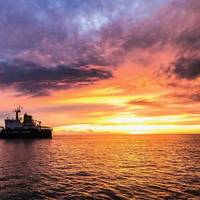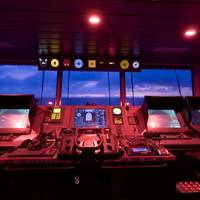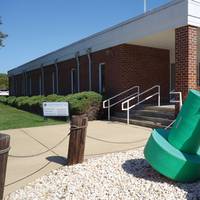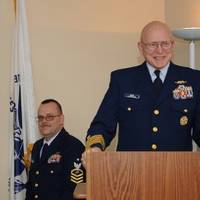USCG Navigation Center: Steering a steady course for safe, secure, efficient waterways

The U.S. Coast Guard’s Navigation Center (NAVCEN) is involved in a number of activities that have an impact on all Americans, even if they don’t realize it.From motorists checking directions with their Global Positioning System (GPS) to boaters to ships coming and going to U.S. ports, the NAVCEN plays an unseen but vital role.With a staff of19 officers, 17 enlisted personnel and 19 civilians, NAVCEN falls under the Director of Marine Transportation Systems (CG-5PW) at USCG Headquarters…
US Coast Guard to Discontinue Remaining DGPS Sites
The U.S. Coast Guard announced today it will discontinue broadcasts from its remaining 38 Differential GPS (DGPS) sites over the next three years, completing system reductions that began in 2016. The staged reduction of the remaining Coast Guard DGPS broadcast sites will begin in 2018 and end with the last broadcast of GPS corrections over medium frequency in 2020. The U.S. Coast Guard Navigation Center has operated the Nationwide DGPS Service since 1999 to broadcast correction signals on marine radiobeacon frequencies to improve the accuracy and integrity to GPS-derived positions. Lt. Cmdr. “GPS provides sufficient positional accuracy to meet navigation requirements for harbor approaches and to position Federal Aids to Navigation,” Patterson said.
Cyber Threats Prompt Return of Radio for Ship Navigation

The risk of cyber attacks targeting ships' satellite navigation is pushing nations to delve back through history and develop back-up systems with roots in World War Two radio technology. Ships use GPS (Global Positioning System) and other similar devices that rely on sending and receiving satellite signals, which many experts say are vulnerable to jamming by hackers. About 90 percent of world trade is transported by sea and the stakes are high in increasingly crowded shipping lanes.
Safeguarding GPS When Global Positioning Doesn’t Work

Suppose the Global Positioning System (GPS) receivers used for your vessel, offshore oil platform, or port facility could not generate position data needed for your operations. How would your crew or staff respond? Initial troubleshooting efforts may indicate equipment failures, antenna masking, or possibly human error. Additionally, the lack of position data will likely force your crew or staff to resort to secondary means to obtain position information. If position data cannot be regained, then the receivers may have lost GPS due to intentional or unintentional interference.
Reminder of Proper Channel for AIS
The U.S. Coast Guard Navigation Center issued a special notice reminding mariners that any vessel operating in U.S. waters equipped with an Automatic Identification System (AIS) should confirm that the proper channel frequency has been selected. The standard default AIS frequency is 161.975 MHz (AIS1 or channel 87B). The alternate AIS frequency is 162.025 MHz (AIS2 or channel 88B). These frequencies can be verified through the manufacturer’s operation/owner’s manual for the AIS installed. (8/23/10). (Source: Bryant’s Maritime News)
Photo Release: CG Terminates LORAN-C

Vice Adm. Robert J. Papp speaks at a ceremony to mark the shutting down of the LORAN-C signal at the Navigation Center in Alexandria, Va., Feb. 8. Both the maritime and aviation communities have used LORAN-C signals for navigation for more than 67 years. (U.S. The U.S. Coast Guard terminated broadcast of the North American Long Range Navigation-C signal at 3 p.m. Feb. 8 with the U.S. Coast Guard Navigation Center in Alexandria, Va., coordinating the shutdown. The LORAN system…
USCG NAVCEN Change of Mailing Address
The U.S. Coast Guard Navigation Center issued a Special Notice stating that its mailing address has changed. Mail sent to the previous address will not be delivered. The new mailing address is: US Coast Guard Navigation Center NAVCEN MS 7310 7323 Telegraph Road Alexandria, VA 20598-7310 (Source: Bryant’s Maritime News)
USCG, High HDOP Advisory
The U.S. Coast Guard Navigation Center issued a High Horizontal Dilution of Precision (HDOP) Advisory stating that GPS users in certain parts of the world may experience a short period of high HDOP/PDOP on October 8 as a result of a routine Delta-V maneuver with satellite #52 (PRN-31). (10/6/09). (Source: Bryant’s Maritime News)
USCG – HDOP Advisory
The U.S. Coast Guard Navigation Center issued an advisory stating that GPS users may experience short periods of high horizontal dilution of precision (HDOP) on September 11 as a result of a routine Delta-V maneuver with satellite #52 (PRN-31). (9/9/09). (Source: Bryant’s Maritime News)
Differential GPS Site Closure
The Miami, FL DGPS site, broadcast frequency 322 kHz, will be decommissioned and taken permanently off-line September 8, 2009 at 1200 EST. NAVCEN operates the Coast Guard Maritime Differential GPS (DGPS) Service and the developing Nationwide DGPS Service, consisting of two control centers and over 80 remote broadcast sites. The Service broadcasts correction signals on marine radiobeacon frequencies to improve the accuracy and integrity to GPS-derived positions. The Coast Guard DGPS Service provides 10-meter accuracy in all established coverage areas. Typically, the positional error of a DGPS position is 1 to 3 meters, greatly enhancing harbor entrance and approach navigation.






